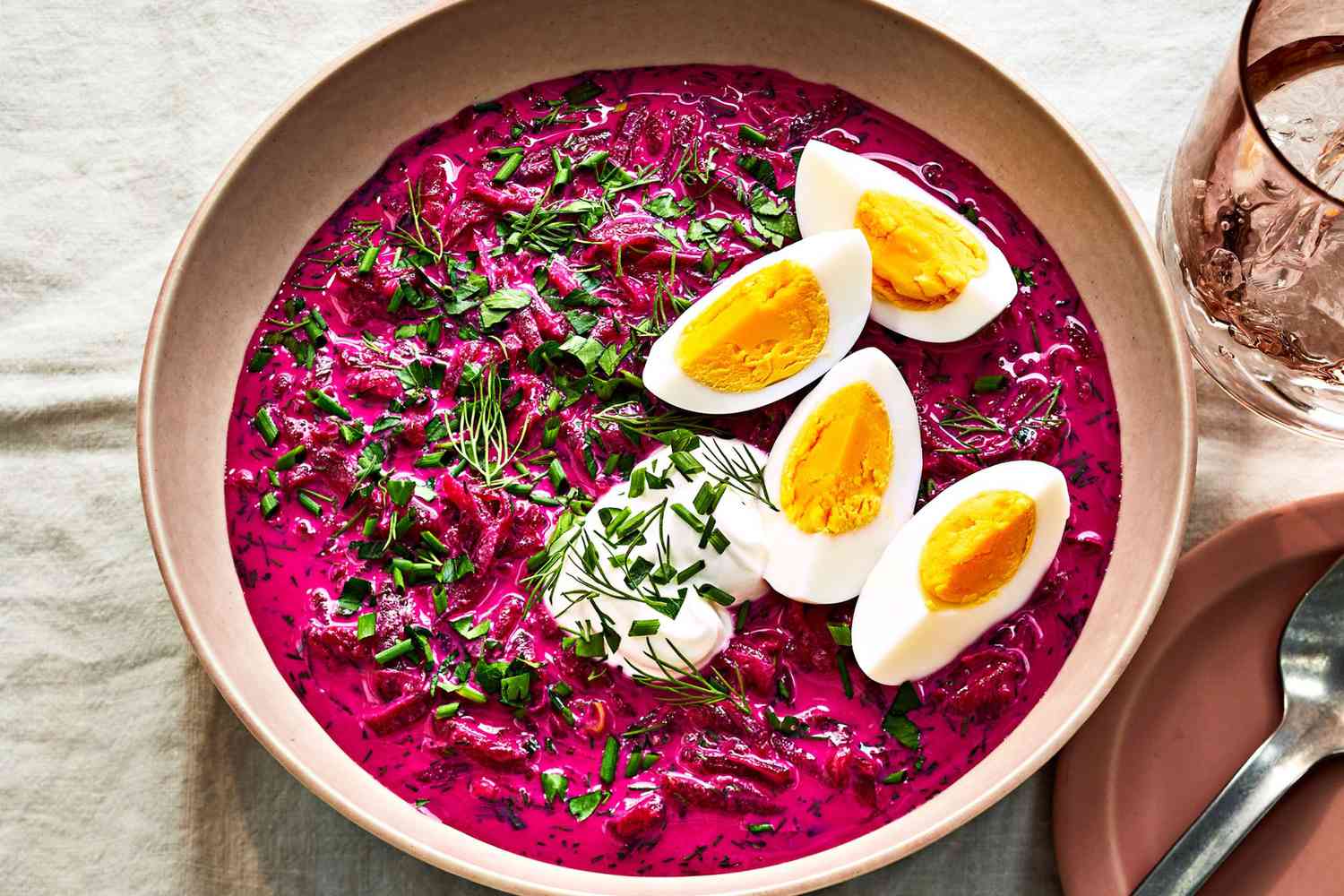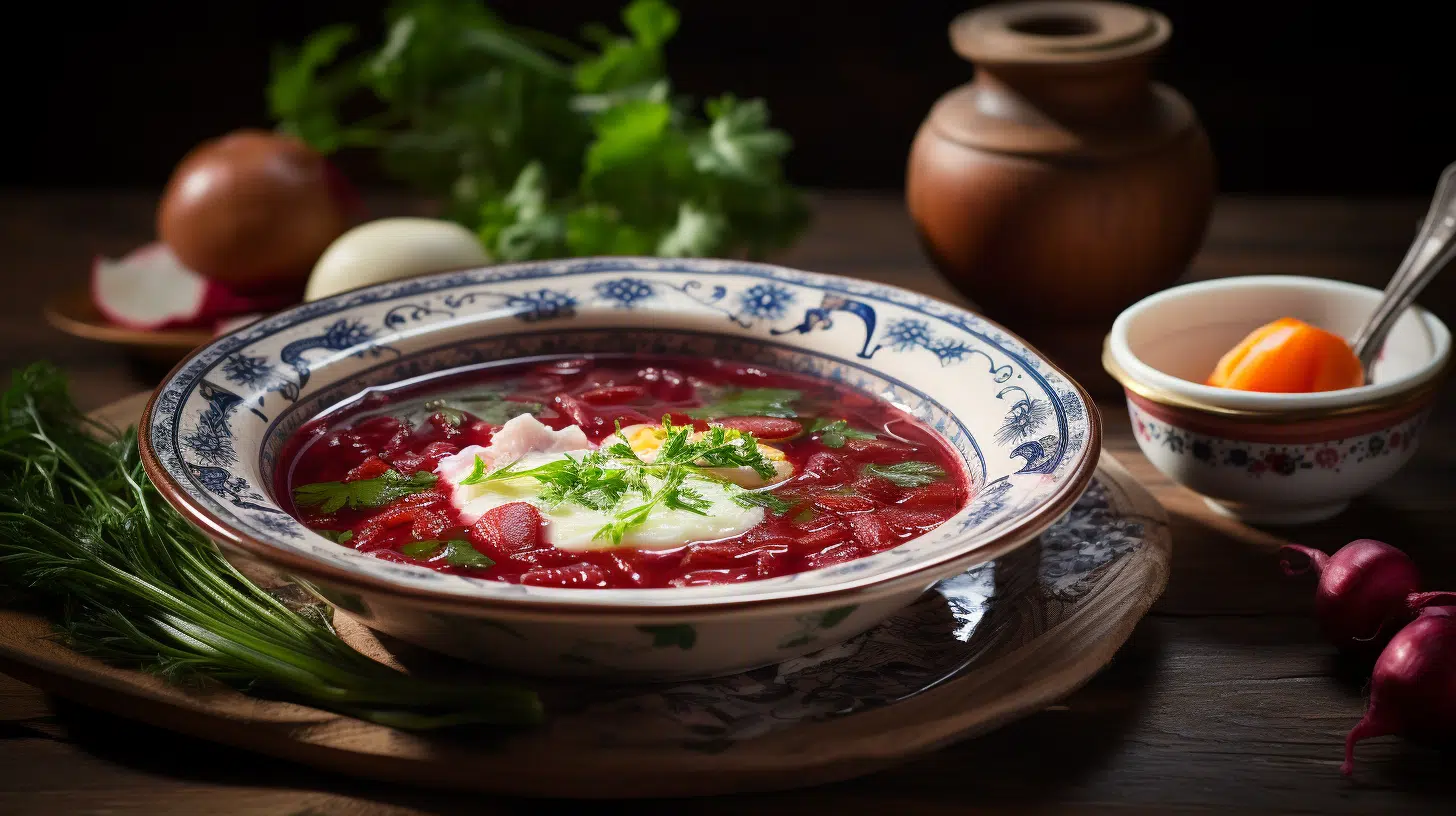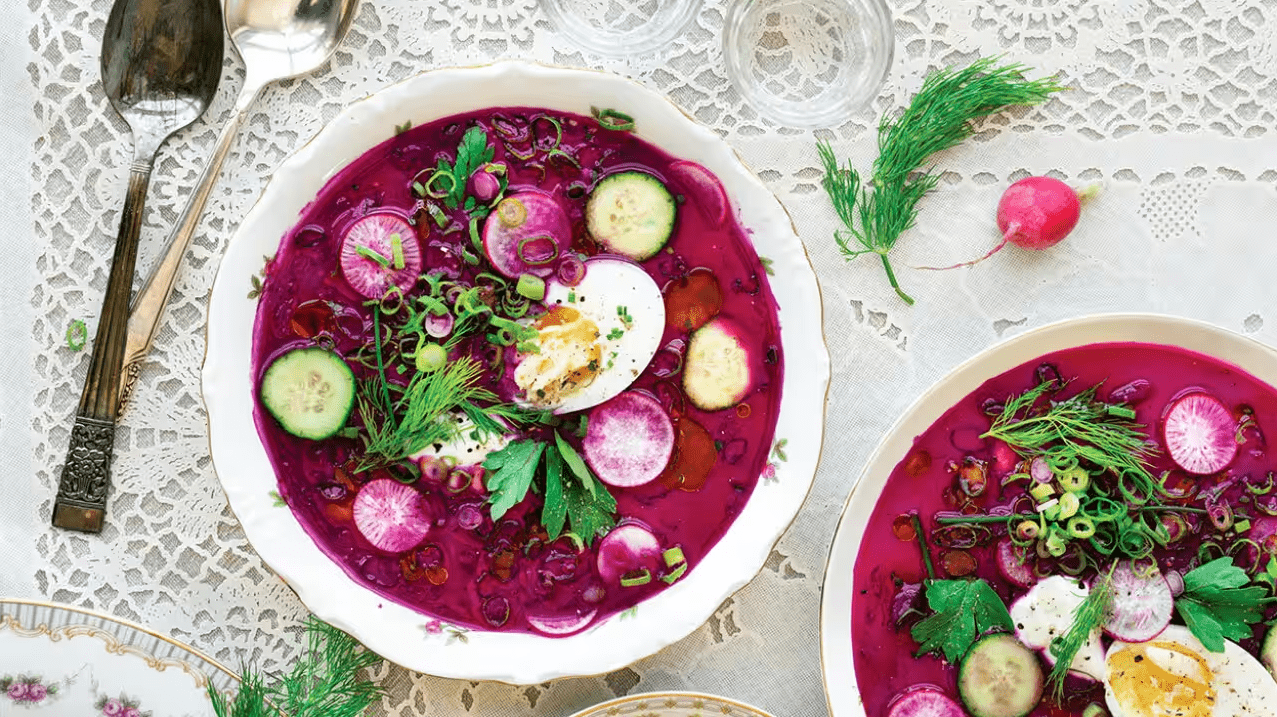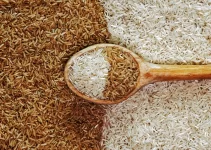Contents
Borscht, a traditional Eastern European soup, has long been celebrated for its rich flavors and comforting qualities. This delightful dish, often made with beets, offers a vibrant and nourishing meal that warms both body and soul. In this article, we will delve into the history, ingredients, preparation methods, and cultural significance of Borscht, inviting you to indulge in the ultimate comfort food experience.
The Rich History of Borscht

Borscht has a storied history that dates back centuries. Originating in Ukraine, this beloved soup quickly spread throughout Eastern Europe, becoming a staple in countries like Russia, Poland, and Lithuania. The word “borscht” is derived from the Slavic word for cow parsnip, an original ingredient in the earliest versions of the soup. Over time, beets replaced cow parsnip as the primary ingredient, giving Borscht its distinctive deep red color.
Cultural Significance of Borscht
Borscht is more than just a soup; it is a symbol of cultural identity and heritage. In Ukraine, Borscht is considered a national dish, often served during holidays and special occasions. It represents the warmth and hospitality of the Ukrainian people. In Jewish culture, Borscht is enjoyed during the festival of Passover, where it is often served cold with a dollop of sour cream.
Ingredients That Make Borscht Special
The beauty of Borscht lies in its versatility. While there are countless regional variations, certain ingredients are commonly found in most Borscht recipes. Let’s explore the essential components that make this soup truly special.
Beets: The Heart of Borscht
Beets are the star of Borscht, providing its signature color and earthy sweetness. These vibrant root vegetables are packed with nutrients, including folate, manganese, and vitamin C. The natural sugars in beets caramelize during cooking, enhancing the soup’s flavor.
Vegetables: A Symphony of Flavors
In addition to beets, Borscht typically includes a medley of vegetables such as cabbage, carrots, potatoes, and onions. Each vegetable contributes its unique taste and texture, creating a harmonious blend of flavors. The combination of these vegetables makes Borscht a nutrient-dense and wholesome meal.
Meat or No Meat: The Choice is Yours
Borscht can be made with or without meat, catering to various dietary preferences. Traditional recipes often include beef or pork, which add depth and richness to the soup. However, vegetarian and vegan versions of Borscht are equally delicious, relying on the natural flavors of the vegetables and spices.
Spices and Herbs: Elevating the Taste
The seasoning is crucial in Borscht, with dill, garlic, and bay leaves being common additions. These herbs and spices enhance the overall taste, adding layers of complexity. A splash of vinegar or lemon juice is often added at the end of cooking to balance the sweetness of the beets and provide a pleasant tang.
Preparing Borscht: A Labor of Love

Making Borscht from scratch is a labor of love that rewards you with a pot of soul-warming goodness. While the preparation process may seem time-consuming, the end result is well worth the effort. Follow these steps to create your own Borscht bliss.
Step 1: Gather Your Ingredients
Before you begin, gather all your ingredients. You’ll need beets, cabbage, carrots, potatoes, onions, garlic, dill, bay leaves, vinegar or lemon juice, and your choice of meat or vegetable broth.
Step 2: Prepare the Vegetables
Peel and grate the beets, chop the cabbage, carrots, and potatoes into bite-sized pieces, and finely dice the onions and garlic. Preparing the vegetables in advance makes the cooking process smoother.
Step 3: Sauté the Onions and Garlic
In a large pot, heat some oil over medium heat. Add the diced onions and garlic, and sauté until they become translucent and fragrant. This step forms the aromatic base of your Borscht.
Step 4: Add the Beets and Broth
Add the grated beets to the pot and stir well to combine with the onions and garlic. Pour in the broth, bringing the mixture to a gentle boil. Reduce the heat and let it simmer, allowing the beets to infuse the soup with their vibrant color and flavor.
Step 5: Incorporate the Vegetables
Add the chopped cabbage, carrots, and potatoes to the pot. Stir to combine all the ingredients, ensuring they are evenly distributed. Continue to simmer the soup until the vegetables are tender, usually around 30-40 minutes.
Step 6: Season and Simmer
Add the dill, bay leaves, and a pinch of salt and pepper to the pot. Let the Borscht simmer for another 10-15 minutes, allowing the flavors to meld together. Taste and adjust the seasoning as needed.
Step 7: Finish with Acid
To balance the sweetness of the beets, add a splash of vinegar or lemon juice to the soup. This final touch adds a delightful tanginess that elevates the overall taste of the Borscht.
Step 8: Serve and Enjoy
Ladle the Borscht into bowls, garnish with a dollop of sour cream or a sprinkle of fresh dill, and serve with a slice of hearty bread. The vibrant colors and rich aroma of the soup will instantly whet your appetite.
Borscht Variations: Exploring Regional Delights
One of the joys of Borscht is its adaptability. Different regions have their unique takes on this classic soup, each offering a distinct twist on the traditional recipe. Let’s explore some popular Borscht variations from around the world.
Ukrainian Borscht
Ukrainian Borscht is perhaps the most well-known and beloved version of this soup. It typically includes beets, cabbage, potatoes, carrots, onions, and sometimes meat. The addition of tomatoes or tomato paste gives Ukrainian Borscht a slightly tangy flavor. It is often served with sour cream and fresh dill.
Russian Borscht
Russian Borscht, also known as “Borshch,” is similar to its Ukrainian counterpart but often includes fermented beet kvass, which adds a unique tanginess. This version may also incorporate mushrooms and kidney beans, making it heartier and more robust.
Polish Borscht
Polish Borscht, known as “Barszcz,” is traditionally served as a clear broth made from fermented beet juice. It is often enjoyed during Christmas Eve dinner, accompanied by mushroom-filled dumplings called “uszka.” This variation is lighter and more delicate, highlighting the natural sweetness of the beets.
Lithuanian Borscht
Lithuanian Borscht, or “Šaltibarščiai,” is a refreshing cold version of the soup. It is made with grated beets, cucumbers, dill, and kefir or buttermilk. This chilled Borscht is perfect for hot summer days, offering a tangy and cooling experience.
Jewish Borscht
Jewish Borscht, often enjoyed during Passover, can be served hot or cold. The cold version, known as “Borscht belt,” is typically sweetened with a touch of sugar and served with a dollop of sour cream. The hot version is similar to Ukrainian Borscht but is often vegetarian, adhering to dietary restrictions.
Health Benefits of Borscht

In addition to its delicious taste, Borscht offers numerous health benefits. Let’s explore why this vibrant soup is not only a treat for your taste buds but also a boon for your well-being.
Nutrient-Rich Ingredients
Borscht is packed with nutrient-rich ingredients that provide a wide range of vitamins and minerals. Beets, for example, are an excellent source of folate, manganese, and potassium. Cabbage is rich in vitamin C and fiber, while carrots provide beta-carotene and vitamin A.
Antioxidant Properties
The vibrant red color of Borscht comes from betalains, powerful antioxidants found in beets. These antioxidants help combat oxidative stress and inflammation in the body, promoting overall health and well-being.
Digestive Health
The combination of vegetables and fiber in Borscht supports digestive health. The fiber aids in regular bowel movements and promotes a healthy gut microbiome. Additionally, the natural acids in the soup, such as vinegar or lemon juice, can aid in digestion.
Heart Health
Borscht’s nutrient profile makes it heart-friendly. The nitrates in beets have been shown to improve blood flow and lower blood pressure. The soup’s high potassium content also helps regulate blood pressure levels, reducing the risk of cardiovascular diseases.
Weight Management
Borscht is a low-calorie and nutrient-dense soup, making it an excellent choice for those looking to manage their weight. The fiber content helps you feel full and satisfied, reducing the likelihood of overeating.
Embracing Borscht in Modern Cuisine
While Borscht has deep roots in Eastern European traditions, it has also found a place in modern cuisine. Chefs around the world are reimagining this classic soup, adding innovative twists and contemporary flair. Here are a few ways Borscht is being embraced in today’s culinary scene.
Borscht-Inspired Cocktails
Mixologists are getting creative with Borscht-inspired cocktails, incorporating beet juice, vodka, and a hint of dill into their concoctions. These vibrant and savory drinks offer a unique and refreshing twist on traditional cocktails.
Borscht-Inspired Fusion Dishes
Chefs are experimenting with Borscht flavors in fusion dishes, combining the essence of the soup with other culinary traditions. Think Borscht-inspired tacos with beet slaw and dill crema or Borscht-infused risotto with roasted beets and goat cheese.
Borscht in Fine Dining
Borscht has made its way onto the menus of upscale restaurants, where chefs are elevating the dish with gourmet ingredients and artistic presentation. These refined versions of Borscht showcase the soup’s versatility and ability to shine in a fine dining setting.
Borscht as a Wellness Elixir
With the growing interest in health and wellness, Borscht is being embraced as a nourishing elixir. Cold-pressed beet juices and Borscht-inspired smoothies are becoming popular choices for those seeking a nutrient-packed and detoxifying beverage.
Conclusion: Savoring the Comfort of Borscht
Borscht is more than just a soup; it is a culinary journey that offers comfort, nourishment, and a taste of cultural heritage. From its humble origins in Eastern Europe to its modern interpretations, Borscht continues to captivate taste buds and warm hearts around the world.
Whether you enjoy it hot or cold, with meat or as a vegetarian situstoto login delight, Borscht invites you to savor the richness of its flavors and the depth of its history. So, gather your ingredients, embrace the labor of love, and indulge in the ultimate comfort food experience with a steaming bowl of Borscht.



